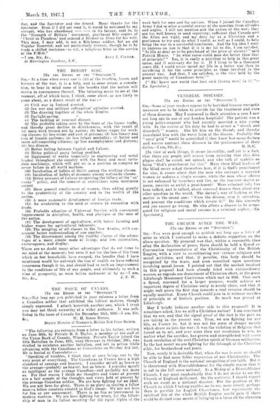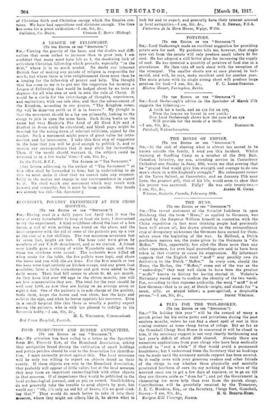TILE CHURCH AFTER. THE WAlt.
(To THZ EDITOR OF ZHE " SPECELT02."1 SLE,—You were good enough to publish not long ago a letter of mine in which I ventured to make a definite suggestion on the above question. My proposal was that, within a reasonable time after the declaration of peace, there should be held a Synod or Convocation representative of the Christianity of the British Empire, with a view to co-ordinating our various religious and moral activities, and that, if possible, this body should be recognized by the State, and even consulted upon questions involving moral issues. I pointed out that the method involved in this proposal had been already tried with extraordinary success, as regards one department of Christian effort, at the greet Edinburgh Missionary Conference which met in 1910. That such a Synod, convened for a larger purpose, would achieve an important degree of Christian unity is surely clear, and that it might well prove the first step towards a real reunion should be equally manifest. Every Church could join in it without sacrifice of principle or of historic position. So much was proved at Edinburgh.
May I briefly indicate another side to this proposal? It is sometimes asked, Are we still a Christian nation? I am convinced that we are, and that the signal proof of the fact is the part we are taking in the present war. True, we are fighting for our life, as France is; but it was not the sense of clanger merely which drove us into the war; it was the violation of Belgium that forced us to act, and ever since then our resolution to win, no matter what the sacrifice, has grown and strengthened with every fresh revelation of the anti-Christian spirit of German militarism. In the last resort we are fighting for the triumph of the Clicistian ethic, for brotherhood and peace.
Now, surely it is desirable that, when the war is over, we should be able to find some fuller expression of our Christianity. The Church of England is the national recognition of our faith. But it is threatened with Disestablishment for the simple reason that it is not in the full sense national. As a Bishop of a Disestablished Church, I say most emphatically that I do not desire to see the Church of England dethroned. On the contrary, I should regard such an event as a national disaster. But the position of the Church to which I belong enables me to see, more clearly perhaps than is possible for English Churchmen, how enormously the spiritual life of the whole British Empire would gain if there could be devised some means of bringing to a focus all the elements of Christian faith and Christian energy which the Empire con- tains. We have had oppositions and divisions enough. The time has come for a great unification.—I am, Sir, &c.,



























 Previous page
Previous page